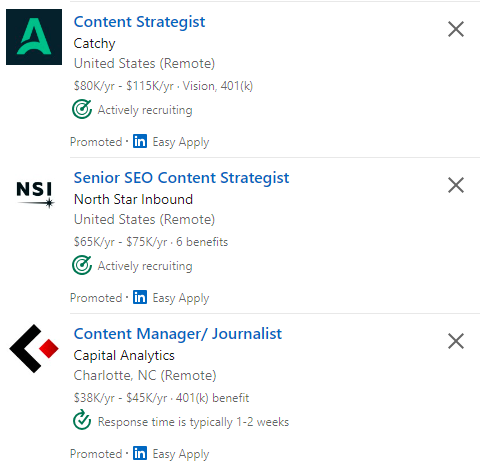AFFILIATE MARKETING
What Are the Duties of a Content Strategist?

You’ve decided you want a career as a content strategist, and we’re here to help you reach your goal. A content strategist is a key player in determining the success of a brand’s content strategy, and it can be an exciting career path.
We discuss below the duties of a content strategist along with tips for becoming the most successful one you can be.
What Does a Content Strategist Do?
A content strategist brainstorms, plans, and executes the content strategy for a brand. This can be done either in a solo environment or with a content strategy team.
The material that’s crafted by content strategists for various social media platforms and other digital marketing efforts is designed with the objectives of the business in mind.
Understanding what content strategists do means we first need to understand content marketing.
Content marketing is a useful type of marketing that involves creating content designed to build interest in a brand’s products or services without explicitly promoting them.
Content strategists are content marketing experts.
For example, a content marketing strategy for a social media coach could involve a series of blog posts about why it’s so important to post on social media.

Now you can understand how a content marketing strategist engages in content marketing in the day-to-day execution of their job.
Content Strategist Job Description
Here is a sample content strategist job description:
The content strategist will develop a content strategy that meets key business objectives. They will reach the brand’s target audience through various marketing channels using their supreme content delivery skills.
The content strategist will use the organization’s content management system to oversee marketing campaigns across a variety of specific social media channels. In addition to content planning and content creation, content strategists will report on how their work met content strategy deliverables.
A typical content strategist salary ranges from $40,000-$80,000 based on location, experience, and the type of company you’re working for.
Here are a few examples of roles for the job title “content strategist” that illustrate a varying salary range based on location throughout the United States:


As you gain more experience and rise in seniority, you could become a senior content strategist or even advance into marketing leadership. It’s up to you where you want to take your career.
The Roles and Responsibilities of a Content Strategist
To add to the content strategist job description, we list the roles and responsibilities of a content strategist below.
The content strategist role varies on a day-to-day basis, but the overall tasks that need to be completed remain consistent. Content strategists will:
- Facilitate content planning sessions across a variety of editorial calendars and marketing channels.
- Perform a content audit of all existing content, evaluate its effectiveness, and update as necessary.
- Conduct extensive keyword research to guide the direction of the brand’s content creation.
- Pitch existing and prospective clients on their content creation ideas.
- Build target audience profiles to create content for.
- Understand the many ways future content can generate leads and be monetized.
- Stay informed on social media trends and changes in consumer behavior.
- Create content across various digital platforms and social media accounts.
- Oversee a marketing team and delegate tasks for ongoing and upcoming projects.
- Collaborate with other team members, like copywriters, UX/UI designers, editors, and more when creating online content.
- Analyze its successful content strategy and report back on its performance. A working knowledge of SEO reporting tools is crucial.
Who Does a Content Strategist Report To?
The content strategist will typically report to a manager in the marketing department. This could include a marketing manager, the vice president of marketing, or the marketing director.
However, keep in mind that every company is structured differently.
For example, a large corporation will be structured differently than a small start-up.
The content strategist role at a start-up might report directly to the CEO. Furthermore, a content strategist at a large corporation might report to the marketing manager.
Depending on how large the marketing team is, the content strategist might report to a more specialized person, like the digital content manager.
Understanding the marketing team structure of the company you want to apply for will help you understand where you fit in the organization.


Types of Companies Content Strategists Work For
Because every type of company can benefit from having a content strategy team, there are a variety of companies a content strategist could work for.
A few types of companies a content strategist could work for include:
Large Corporations:
Major recognizable brands need content strategists to maintain their position in the market as thought leaders.
Marketing Agencies:
Marketing agencies provide a wide range of services, and content marketing is just one of those services. A content marketer will help marketing agencies create engaging content as part of overall content strategies for clients.
Small Start-ups:
Content strategists are an important part of the business for small start-ups because they help attract new and existing customers.
Having content monetization skills can be especially important for start-ups as they run lean in the early days.
Content Agencies:
Content agencies are similar to marketing agencies. However, they provide a more niche service that’s specific to content marketing.
These types of agencies will need to hire teams of content strategists to serve their clients’ content marketing needs.
Freelance:
There is another option that’s entirely different from the employers we’ve discussed on this list. That alternative is freelancing.
A career as a freelancer means that you will be self-employed and responsible for obtaining your own clients, delivering the project, and billing the client.
While there is potentially more money to be made as a freelancer, it does also come with more risk.


What Skills Do You Need to Become a Content Strategist?
Becoming a successful content strategist requires a variety of soft skills and technical expertise. We break down the necessary skills in each category below.
Soft Skills
Here are a list of the soft skills you’ll need in your career as a content strategist:
Storytelling:
You will need to tell compelling stories to a variety of audiences as a content strategist. Whether it’s pitching ideas to clients or educating your audience, you will need to learn to relay information in an engaging way.
Creativity:
Ultimately, you’re creating content for your target audience to consume. This means that it needs to be engaging, exciting, and creative. Having creativity will help you put together the best content.
Communication:
As a content strategist, you are communicating every day. Whether it’s to your boss, other teams within the company, or your target audience, having top-notch communication skills will be very important.
Organization:
An aspiring content strategist needs to be very organized. They will be managing multiple campaigns simultaneously, so they need expert organizational skills to keep everything running smoothly.
Technical Skills
Beyond the very important soft skills you’ll need, there are a variety of technical skills that you’ll also need in your career as a content strategist.
Here are a few of them:
Writing:
Strong technical writing skills are one of the most important hard skills you’ll need. Being able to write high-quality long-form content will be a key component of your job.
Search Engine Optimization:
SEO is another one of the most important technical skills you will need to have in your career. You’ll need to understand how to perform keyword research with SEO research software, along with how to seamlessly incorporate these keywords into the text as part of the content creation process.
Social Media Platforms:
Having an understanding of the posting style of each of the different social media platforms will be helpful to your success as a content strategist.
Your long-form content will be shared with your audience in the form of social media campaigns. If you’re able to lend your knowledge when creating these campaigns, you will be able to provide more value for your team.
Monetization:
Part of the content strategist’s job is understanding how the content you’re creating can be monetized and earn your employer money.
Whether it’s incorporating banner ads or partnering with affiliates, you will need to be an expert in monetization methods for the content strategies you implement.


Tips for Becoming a Content Strategist
You know the skills you need to develop and what the job description entails. Now it’s time to discuss tips for optimizing your career in content marketing. Read our top 5 tips for becoming a content strategist below.
Prioritize Your Education
You will need to have the knowledge if you want to earn a job as a content strategist. This means that prioritizing your education should be at the top of your list.
While this doesn’t necessarily mean you have to have a bachelor’s degree, some employers might require you to have one. For example, if you want to work at a large corporation or a major brand where you work your way up to a leadership position, they might require a bachelor’s degree for those types of roles.
Examples of bachelor’s degrees that you could obtain include marketing, journalism, public relations, or communications.
Gain Professional Experience
After you’ve obtained the education, you want to add professional experience to your resume.
Professional experience can occur in many forms, including internships and paid positions. Learn from the other content strategists you’re working with as you contribute to content marketing campaigns.
Whether you’re working directly as a content strategist or something adjacent to this position, give it your best effort to learn as much as you can while also impressing your employer.
References from internships and entry-level jobs will be helpful to you in the future!
Start Networking
In addition to developing your skills, you’ll also want to start networking.
Networking with other professionals in the industry will be helpful for you when searching for jobs. Sometimes, jobs aren’t even posted on online job boards, and instead, companies ask for referrals from their existing employees.
Similarly, when employers are looking at a large stack of resumes, seeing a name they recognize makes the hiring process easier for them.
Also, remember that you’re networking with people of all experience levels, not just people who are more advanced than you in your career. The person that you’re taking a course with could one day be promoted to the marketing manager you’re applying to work for.
All this to say, conduct yourself professionally and courteously when networking.


Show Your Expertise Through Personal Projects
Even if you haven’t obtained that internship or first job yet, you can showcase your expertise through your personal projects.
Starting your own blog site, YouTube channel or newsletter will help you develop skills and gain hands-on experience.
Working on your own projects requires you to develop a content strategy, create content, and grow your audience.
How long does it take to make money from a blog? You will be able to answer this question for future employers based on firsthand knowledge.
You can then tell future employers about your expertise and the success of your marketing campaigns.


Always Continue Learning
Even though education was already a priority for you on your path toward being a content strategist, learning will always be important for furthering your career.
Whether it’s taking online courses, reading books, or listening to podcasts, find the learning method that feels right for you.
Courses are a great way to further your education as a content marketer. Here are two great courses to get you started:
The Affiliate Lab


The Affiliate Lab is an expert source on creating content optimized for SEO. This course contains more than 100 hours of training on how to conduct keyword research, select your niche, rank in search results, and more.
If you’re looking to improve the SEO rankings of your content, this course is for you. Niche Pursuits readers receive an exclusive discount of $200 off The Affiliate Lab course here.
Project 24
If you want to learn how to drive real results, Project 24 is the course for you. This will help teach you how to create the best possible content for a blog site or YouTube channel.
Its 27 online courses will teach you how to create and monetize content that’s been optimized for SEO.
The end goal of this course is to teach you how to generate passive income from your content marketing efforts. Check out our Income School Review to learn more about Project 24 and its founders.
No matter which course you choose based on your goals, what’s important is that you’re expanding your knowledge base to create results-driven content.
Your Career as a Content Strategist
Whether you work for a fast-paced marketing agency or an exciting brand, your career in digital content creation is sure to be an exciting one. We wish you the best of luck in your career as a content strategist!



![How AEO Will Impact Your Business's Google Visibility in 2026 Why Your Small Business’s Google Visibility in 2026 Depends on AEO [Webinar]](https://articles.entireweb.com/wp-content/uploads/2026/01/How-AEO-Will-Impact-Your-Businesss-Google-Visibility-in-2026-400x240.png)
![How AEO Will Impact Your Business's Google Visibility in 2026 Why Your Small Business’s Google Visibility in 2026 Depends on AEO [Webinar]](https://articles.entireweb.com/wp-content/uploads/2026/01/How-AEO-Will-Impact-Your-Businesss-Google-Visibility-in-2026-80x80.png)













